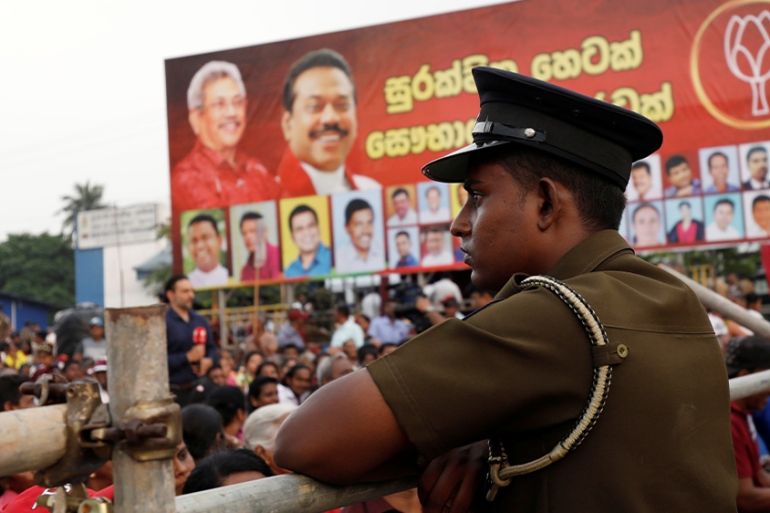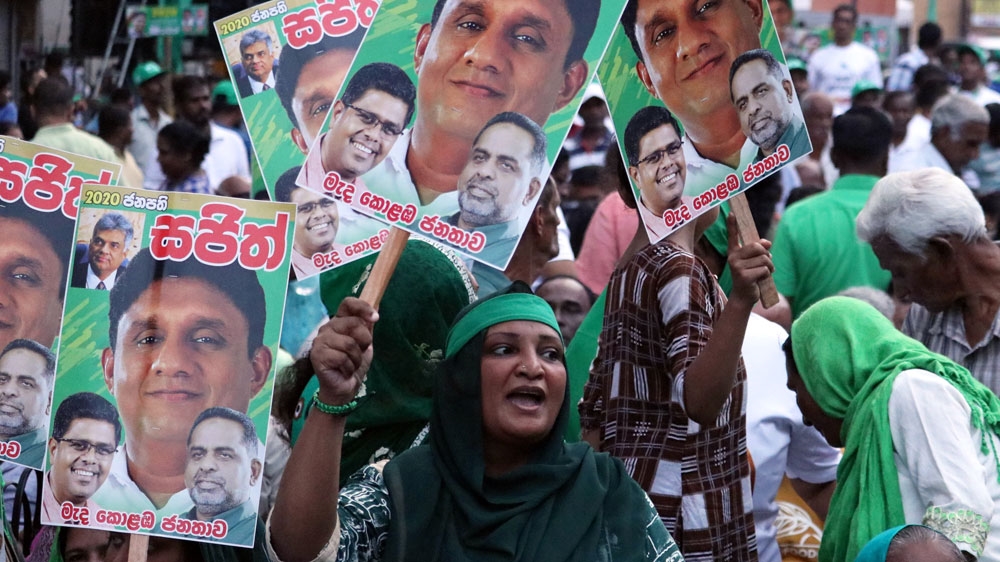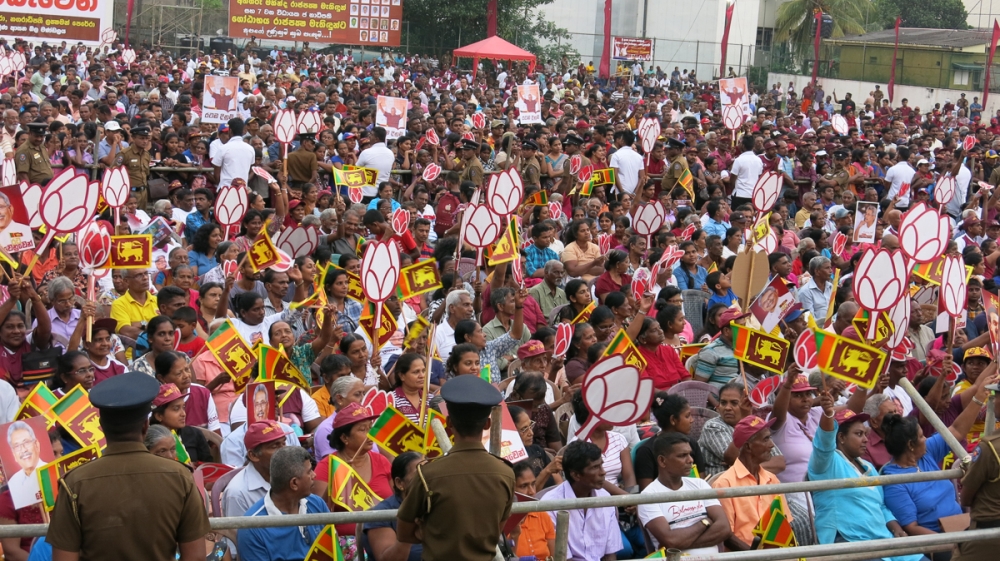In Sri Lanka, fear and uncertainty ahead of presidential vote
Former defence chief Rajapaksa’s supporters stir ethnic tensions as he takes on the ruling party’s Premadasa.

Colombo, Sri Lanka – At Kesbewa, a suburb of Sri Lanka‘s capital Colombo, thousands of supporters of the Sri Lanka Podujana Peramuna (SLPP) party wait for hours in the driving rain for the man they believe will be the country’s next president. Clad in maroon party shirts, they wave flags and cardboard cut-outs of the young lotus, the party’s symbol.
Minutes later, Gotabaya Rajapaksa, the SLPP’s candidate for president and brother to former two-time president Mahinda Rajapaksa, arrived to raucous cheers as fireworks went off and many supporters lit bright red flares.
Keep reading
list of 3 itemsA record 35 candidates vie for Sri Lanka’s presidency
President Maithripala Sirisena to not contest Sri Lanka polls
“Put your trust in me,” he told them, closing out what has been a hectic six weeks of official campaigning. “Make sure that you take care of your responsibility. [I promise] a safe country, a prosperous country and a confident nation.”
About 20km away, green fairy lights were strung across what is normally a busy commercial road in the heart of Colombo’s Maradana area, as thousands of supporters of the SLPP’s rival United National Party (UNP) awaited their candidate, Sajith Premadasa.
Clad in a white shirt and garlanded with flowers and a green shawl, Premadasa told supporters the UNP – which has controlled parliament since 2015 – will usher in a new era of prosperity.
“We will start a new era within a united Sri Lanka by strengthening national security, protecting sovereignty and integrity, safeguarding political freedom, and giving prominence to Buddhism, while also protecting other religions,” he said.

Sri Lankans go to the polls on Saturday in an election that has seen an energetic – and, at times, ethnically divisive – campaign between the two frontrunners, Premadasa and Rajapaksa.
Premadasa, representing the ruling party, has built his campaign on promising a mixture of continuity and new leadership.
Rajapaksa, a former defence chief under whom Sri Lanka’s 26-year war with Tamil rebels ended, has promised a return to the policies of his brother Mahinda, who many rights groups accused of widespread violations during his 10-year rule.
Showdown with PM?
Whoever wins, a showdown with Prime Minister Ranil Wickremesinghe appears to be on the cards, with Rajapaksa likely to attempt to unseat him, while Premadasa has also promised to replace the powerful UNP leader.
In October last year, outgoing President Maithripala Sirisena attempted just that, dismissing Wickremesinghe through a presidential order and appointing Mahinda Rajapaksa – Gotabaya’s brother – in his place, a move that prompted weeks of political unrest and was ultimately struck down by the Supreme Court.
“If Gotabaya [Rajapaksa] wins, […] they will be faced with the same situation they had before: how do you get rid of the PM,” said Alan Keenan, the International Crisis Group’s (ICG) Sri Lanka project director.
Sri Lanka will hold a parliamentary election following the presidential vote, but it cannot legally be held before February.
“How do you buy and cajole and threaten enough people in parliament to switch sides to have a no-confidence vote [against PM Wickremesinghe]?” asked Keenan.
He pointed out that for Premadasa, who may belong to the same party as the prime minister but has had serious differences with him, including on his own presidential nomination, will also try to distance himself from the previous government.
“Morally, it makes it harder for Sajith Premadasa to say he will bring in a new government, because he will be stuck with the same PM who is unpopular, or he will have to find a plan to eject him.”
Sluggish economy worries
For voters, questions of constitutionality appear to be far from the top of their electoral priorities. The South Asian country has faced sluggish economic growth in recent years, with the International Monetary Fund (IMF) estimating that gross domestic product growth in 2019 will slow further to 2.7 percent.
Burdened with $34.4bn in foreign debt (38 percent of GDP) – much of it owed to China for projects undertaken during the Mahinda Rajapaksa-led government – the government has struggled to pay back loans while also generating jobs and income.
“The cost of living is very high, and the youth are not able to get jobs,” said MB Nandipala, 75, a retired factory worker who supports Gotabaya Rajapaksa.
Premadasa supporters, too, said they were feeling the economic pinch and were hoping his leadership could help steer the UNP government towards better policies.

“Poverty is the biggest problem facing Sri Lanka right now,” said Melanie Perera, 46, a tailor who supports Premadasa for president. “We hope that there will be jobs created.”
Paikiasothy Saravanamuttu, executive director at the Colombo-based Centre for Policy Alternatives, said there was not much to choose between the two candidates’ economic plans.
“They are both sort of very [similar] – the two of them believe that poverty is the main issue in the country and that it needs to be gotten rid of through discipline and economic rights,” he told Al Jazeera.
Divisive campaign on ‘national security’
In April, a series of six coordinated bombings hit three churches and as many luxury hotels rocked Sri Lanka, killing more than 269 people and wounding at least 500 others.
The attacks shattered the calm and relative security the island nation had enjoyed in the 10 years since the end of the war with Tamil rebels.
Almost immediately, Gotabaya Rajapaksa announced his intention to run for president, predicated on the stance that he and his brother had ended the war against the Tamils and could deliver strong leadership.
“We were introducing a clear programme to ensure security of this country after we ended terrorism,” he told the crowd in Kesbewa on Wednesday. “But this government … failed to give prominence to national security. That is why bombs started to go off again in this country.”
Rajapaksa is supported by a number of Buddhist monks, many of whom have backed strong security actions against the country’s roughly 10 percent Muslim population.
Premadasa, too, has been backed by monks, although his agenda has not been as identified with the strand of Sinhalese nationalism that has run through the Rajapaksa campaign.
“This is the only Sinhalese country in the world,” said DW Danushka, 32, a Rajapaksa supporter at a recent rally. “The minorities also live in this country, but they should stay in a certain way.
“We should live in harmony, but Buddhists should be given priority.”
In the background, a Rajapaksa campaign song played over an array of speakers: “If we are divided, we will be destroyed”.
Non-Sinhalese on the island say they fear the consequences of another Rajapaksa presidency, given widespread allegations of war crimes – including enforced disappearances, extrajudicial killings and arbitrary arrests – made during the previous Rajapaksa government.
Ahilan Kadirgamar, a prominent academic in the northern city of Jaffna, said the later years of the Mahinda Rajapaksa era were characterised by an attempt to “construct Muslims as the new enemy”.
A recent ICG report documents numerous incidents of violence directed at Muslims since 2011, which saw a resurgence following the Easter Sunday attacks.
“The prospect of a new Rajapaksa presidency has heightened ethnic tensions and raised fears among minorities and democratic activists,” said a statement released by the ICG on Wednesday.
In the north, dominated by the country’s roughly 11 percent Tamil minority, Kadirgamar expects most people will vote against Rajapaksa.
“I think this election for the Tamil voters in particular, and generally the north, is going to be a major protest vote against Gotabaya Rajapaksa,” he told Al Jazeera.
“He was defence secretary who … was responsible in the last days of the war and he oversaw post-war repression and militarisation [of the north] in the five years after the war.”
Kumaravadivel Guruparan, a law professor at the University of Jaffna, said he did not expect either candidate to seriously engage with Tamil voters’ issues, including the decentralisation of power and accountability for alleged war crimes committed by the military.
|
|
“For the Tamils, presidential elections have always been a matter of choosing the lesser devil, particularly after the war,” said Guruparan. “None of the candidates would come forward to talk about solutions to the national questions, of war crimes, accountability, and the specific needs of northeast when it comes to post-war development.”
Saravanamuttu believes that the island’s non-Sinhalese-Buddhist minorities, which make up roughly 25 percent of the population, could be decisive, but are unlikely to benefit regardless of who wins.
“The Sinhalese majority will be split about 50-50, and the minorities will be decisive but will get nothing out of the result,” he predicted.
Potential ‘spoilers’
Sri Lanka’s presidential vote is conducted under a contingent vote system, where voters express their top three preferences for president. If one candidate is unable to attain more than 50 percent of the vote, the votes of those who listed them as their second preference will be added to the tallies of the top two candidates to pick a winner.
In such a situation, analysts say, voters are being forced to think strategically about who they back.
Two other candidates – Anura Kumara Dissanayake of the Janatha Vimukthi Peramuna (JVP) and Mahesh Senanayake of the National People’s Movement (NPM) – have emerged with the possibility of breaking either candidates’ vote bank, they say.
“If it becomes a close election, the extent to which the JVP’s Dissanayake or the former army commander Senanayake take away votes from Premadasa or Rajapaksa could prove crucial in terms of who wins,” said Guruparan.
Speaking to Al Jazeera on Thursday, Senanayake, who retired as army chief in August, said while he did not expect to win, he was determined to run as “an apolitical candidate”.
“It is not about winning [necessarily], it is about exhibiting our protest against the [political] system,” he said.
Back at the rally in Kesbewa, as Gotabaya Rajapaksa descended the metal stairs to head to his next campaign rally, a voice boomed over the speakers exhorting people to stay in their seats.
“The honourable Mahinda Rajapaksa […] will be arriving soon,” said the announcer.